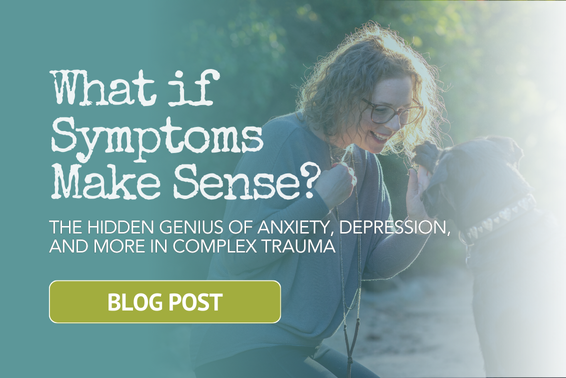
EMDR Certified Isn’t the End—It’s the Beginning
How We Prepare You for Complex Trauma
Written by Susie Morgan, LMFT, BCETS - September 21, 2025
So many clinicians tell me: "I finished Basic Training... now what?" If you're feeling that gap between being EMDR-trained and being truly confident with Complex Trauma, you’re not alone—and this is for you.
In short: EMDRIA Certification is a professional milestone that establishes baseline competency in Standard Protocol. But Advanced Certification in Precision EMDR™ for Complex Developmental Trauma is a deeper, mentored path.
It’s about learning how to safely and effectively work with attachment, dissociation, and the layered complexity that shows up in our offices every day.
What EMDRIA Certification Is (and Why It Matters)
It’s not a buzzword—it’s a credential that reflects a structured investment in delivering EMDR therapy with fidelity to the model.
Different programs describe pathways to becoming EMDR Certified; clinicians should verify how those align with EMDRIA’s published criteria for certification if becoming an EMDRIA Certified Therapist is their goal.
The EMDR International Association (EMDRIA) describes its purpose as "to promote, foster, and preserve the highest standard of excellence and integrity in Eye Movement Desensitization and Reprocessing (EMDR) practice."
To become an EMDRIA Certified TherapistTM, you need:
- Completion of an EMDRIA-Approved Basic Training
- 12 hours of EMDRIA-Approved Advanced Training
- 20 hours of EMDRIA-Approved Consultation (10 of which may come from your Basic Training)
- To have provided EMDR therapy with a minimum of 25 different clients for at least 50 hours
- Additional application components as specified by EMDRIA
If your goals include EMDRIA Certification or participation in advanced EMDRIA-Approved trainings, completing an EMDRIA-Approved Basic Training is foundational—it’s a required step for certification and a common prerequisite for many advanced programs.
Participating in a structured training, consultation, and skills verification process can foster deeper conceptual understanding, increased clarity in practical application, and consistent fidelity to the key components of the model.
Two Clear Pathways to EMDRIA Certification with Precision EMDR™
We’ve mapped it out clearly so you’re never left guessing.
Pathway 1
- EMDRIA-Approved Basic Training (ours or another)
- 10 hours Individual Consultation (with work sample skills verification)
- 10 hours Group Consultation (structured alongside Decoding Complex Developmental Trauma - Part 1)
Pathway 2
- EMDRIA-Approved Basic Training
- 20 hours Individual Consultation (with work sample skills verification)
- Decoding Complex Developmental Trauma - Part 1 (fulfills the 12 CE Advanced Training requirement)
Whichever path you choose, we walk with you from start to finish. And our mentorship is grounded in real-world clinical experience with Complex Trauma and Attachment.
Our focus goes beyond the basics—emphasizing thoughtful, attuned development to help you work confidently with complexity.
The backstory (in brief): Why I Created Advanced Certification in Complex Trauma
It’s what I didn’t receive that showed me how to build what others need.
Here’s the short version of the longer story I share in the video: Early in my career, I encountered cliquishness and inadequate support—right at the moment I most needed mentorship and community. It hurt (and hit every awful memory nerve from junior high, if I’m honest).
But in the end, it became a catalyst—and, looking back now, a gift.
It compelled me to train relentlessly, seek consultation widely, and learn every proper term and nuanced strategy I could. Then I curated and synthesized it all into a clear methodology for safely and effectively conceptualizing and treating complexity.
That body of work became our readiness lens, our strategic target sequencing, and our approach to unwinding affect and attachment-management strategies while repairing the attachment system.
That became Precision EMDR—and eventually, it became our Advanced Certification in Complex Developmental Trauma—built so you don’t have to DIY your way through it the long, hard way.
It’s the structure and support I needed back then, and the one I now offer to you.
→ Want the full story and why this matters in the room? Scroll to watch the video linked below.
What Advanced Certification Involves—Because EMDRIA Certification is only the beginning.
This is about more than knowing protocol—it’s about cultivating nuanced clinical judgment, attuned timing, and a grounded instinct for flexible, precise work.
To qualify for Advanced Certification, you’ll need:
- Prior (or simultaneous) completion of EMDRIA Certification
- Completion of both:
- Decoding Complex Developmental Trauma – Part 1 (15 CEs)
- Decoding Complex Developmental Trauma – Part 2 (18 CEs)
- Plus one of:
- Precision EMDR™ Basic Training (42 CEs)
- Refresher Essentials (12 CEs)
- OR other Advanced Precision EMDR™ Trainings totaling 12 CEs*
- 10 hours of Individual Consultation with Precision EMDR™ Consultant, including:
- Skills verification in Readiness, Target Sequence Planning, and Reprocessing with Complex Trauma (via case presentation and video review)
(*See our website for details, exclusions, and CE clarification.)
Our Advanced Certification in Precision EMDR for Complex Developmental Trauma doesn’t replace EMDRIA Certification. It builds on it.
Common Objections I Hear (and What’s Actually True)
Let’s name the fears—and the facts.
"It’s too expensive. Will it really pay off?"
Yes. Specializing in complex trauma can lead to more effective outcomes, a fuller caseload, and greater sustainability in your work. EMDR, when applied well, can be truly transformative. But because it's such a powerful intervention, using it without adequate support or integration can contribute to client dysregulation. That’s why many clinicians find that structured training and consultation help them feel more confident, clear, and grounded—especially when working with complexity.
"I feel bad charging more."
Our field is full of helpers—and many of us (especially women) were socialized to give without expecting fair pay. But carrying profound responsibility deserves compensation. You carry people’s stories, pain, and hope. This work is demanding, sacred—and valuable.
"It takes too much time."
Yes, training and consultation take time. But without proper support, many clinicians burn out. Learning deeply now means you don’t have to white-knuckle your way through every complex case later.
What You Can Gain (Beyond a Certificate)
- Clarity: Know what to look for, when to start, and how to intervene.
- Safety: Assess readiness, dissociation, and memory networks with confidence.
- Momentum: Learn in a way that integrates theory and practice, so what you gain shows up in the room—not just on a CE certificate.
Want the full story behind why I built this path? Scroll to watch the video linked below.
Then:
- Download the EMDRIA Certification Checklist to see where you are in the process
- Explore the Advanced Certification requirements
- Schedule a call if you want help mapping your next steps
You don’t have to do this alone.
*CLICK HERE for more information about the EMDRIA International Association and how it defines its purpose and requirements for EMDRIA-Approved Trainers and EMDR Training Providers. EMDRIA requirements are subject to change. Be sure to check EMDRIA.org to review the most current requirements to become an EMDRIA Certified TherapistTM.


.png)

